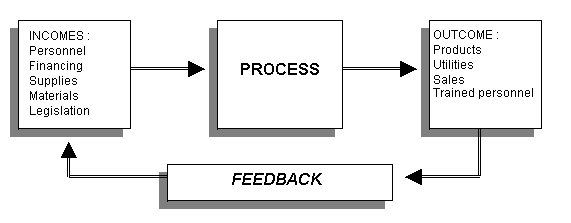The Focus of Systems in Administration.
The focus of systems revolutionized the existing administrative focuses. It conceives the enterprises as social systems immersed in systems that inter-relate and are affected mutually.
The origins of this focus goes back to Aristotle's conceptions of "cause and effect", and that every whole is a part of a bigger one. The modern systems theory was developed through contributions from Ludwing Von Bertalanffy, who indicated that there is no independent physical or chemical element. Every element is integrated into relatively independent units.
In 1954, Kenneth Boulding wrote an article named "The general theory of systems and the scientific structure". This article is considered of great relevance since it revolutionized the scientific and administrative way of thinking.
A system can be defined as "a group of elements intimately related that act and interact with each other towards the attainment of a determined end".
Systems can be classified according to:
- The degree of interaction with other systems: open, semi-open or semi-closed and closed.
- Their objective and material composition: abstract and concrete.
- Their capability of response: active, passive and reactive.
- Their internal mobility: static, dynamic, homeostatic and probabilistic.
- Their degree of dependency: independent and interdependent.
In any system, we can find four basic elements to make it function :
1. Incomes or supplies: they supply the system its necessities to fulfill its mission.
2. Processing: it is the transformation of supplies.
3. Outcomes or product: It is the result of the process.
4. Feedback: it is the answer of the systems which have received as a supply the product of previous system or the response of the environment.
In a graphic, an enterprise seen as a system is represented in the following manner:

Systems are composed of sub-systems, for example, the human body is a system. It also has sub-systems; circulatory, respiratory, nervous, etc. An enterprise is composed by sub-systems; finance, personnel, marketing, etc. Moreover, every system forms an integral part of a larger one,commonly known as macro-system or supra-system. For example, a tree is a system that is part of a vegetable macro-system, which in turn is a part of the ecology of the planet, and so on and so forth

